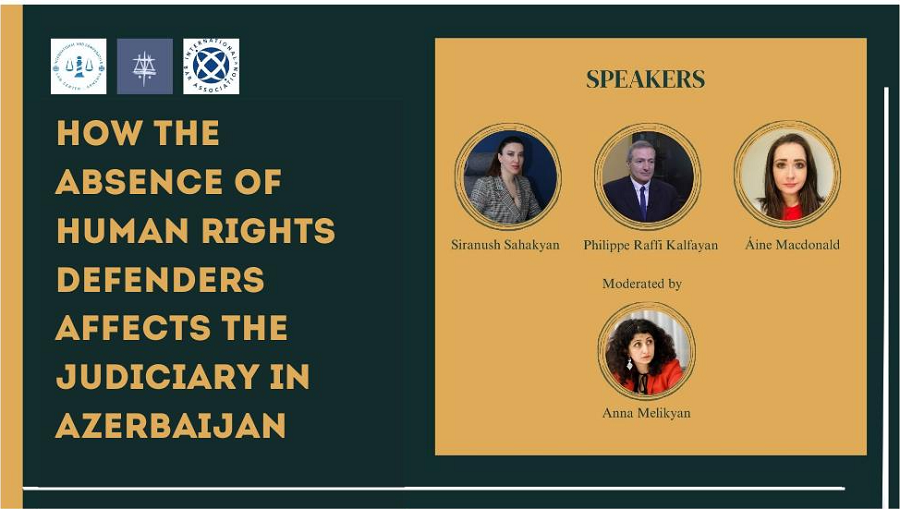On 5 May 2025, a side event titled “How the Absence of Human Rights Affects the Judiciary in Azerbaijan” was held during the OSCE Supplementary Human Dimension Meeting in Vienna. The event was organized by the International Bar Association and the International and Comparative Law Center – Armenia, with the support of the Armenian Legal Center for Human Rights and Justice. Additional contributions were provided by the “Union of Artsakh” NGO and the “Protection of Rights Without Borders” NGO. The event gathered leading international legal experts to discuss the systematic erosion of human rights and its impact on the judiciary and rule of law in Azerbaijan. The discussion drew urgent attention to the silencing of legal professionals, the weaponization of judicial institutions, and the persecution of Armenian detainees.
On 5 May 2025, a side event titled “How the Absence of Human Rights Affects the Judiciary in Azerbaijan” was held during the OSCE Supplementary Human Dimension Meeting in Vienna.
Ms. Aine MacDonald of the International Bar Association Human Rights Institute opened the panel with a powerful presentation on the deteriorating condition of the legal profession in Azerbaijan. She presented an overview of the current state of the legal profession and the functioning of the Bar in Azerbaijan, emphasizing its alarming role in suppressing human rights lawyers. In particular, she highlighted the ongoing persecution of independent legal professionals through measures such as suspension, disbarment, and criminal prosecution, that have fostered a pervasive environment of fear within the legal community. Addressing the lack of judicial independence in Azerbaijan, she expressed deep concern over the judiciary’s inability to fulfill its constitutional role due to undue influence and systematic interferences from the executive branch. Ms. Macdonald noted that repressive practices have expanded to target not only human rights defenders but also lawyers representing clients in politically sensitive cases. The Bar has been increasingly instrumentalized for these purposes, exacerbating the already critical situation. The lack of an independent Bar has had particularly harmful consequences for the right to legal defense, effectively denying many individuals their right to a fair trial. She drew particular attention to the situation of ethnic Armenians facing trial in Azerbaijan on politically motivated and fabricated charges. These individuals are deprived of effective legal representation, an essential component of a fair trial, due to the climate of fear and intimidation.
Mr. Philippe Kalfayan, representing the International and Comparative Law Center – Armenia, expanded on the systematic persecution of human rights defenders in Azerbaijan, referencing multiple judgments from the European Court of Human Rights that confirm the politically motivated nature of such prosecutions. Speaking from his experience representing Armenians subjected to sham trials in Baku, Mr. Kalfayan underlined the impossibility of securing impartial legal representation for Armenian detainees. Azerbaijani lawyers, he noted, openly admit that trial outcomes are predetermined by the authorities. He called on OSCE participating States to invoke the Moscow Mechanism to investigate Azerbaijan’s human rights abuses, particularly in relation to ethnic Armenian detainees.
Ms. Siranush Sahakyan, Head of the International and Comparative Law Center – Armenia, addressed the structural denial of justice in Azerbaijan’s judiciary. Drawing from her legal representation of Armenian POWs before the European Court of Human Rights and UN bodies, she noted that she has been consistently denied access to clients, obstructing defense preparation. She described pervasive institutionalized Armenophobia, and highlighted that some detainees have been mistreated in the presence—or even with the complicity—of their state-appointed lawyers. Ms. Sahakyan warned of Azerbaijan’s blatant disregard for international humanitarian law, as acts protected under combatant immunity are misclassified as terrorism. She further noted that judges involved in these trials are known for past politically motivated rulings, casting serious doubt on their independence and impartiality.
Read also
The panel was moderated by Ms. Anna Melikian, who underscored the deepening authoritarianism in Azerbaijan, citing documentation by Amnesty International, Human Rights Watch, Freedom House, and the UN Committee Against Torture. She noted the intensification of repression since November 2024, including surveillance, arrests of antiwar activists and social media users, and transnational repression tactics targeting dissent beyond Azerbaijan’s borders.
This event served as a stark reminder of the collapse of judicial independence in Azerbaijan and its devastating impact on both domestic rights defenders and ethnic minority detainees. Speakers called on international actors to take immediate and coordinated action to uphold the principles of justice, accountability, and human dignity.
International and Comparative Law Center — Armenia NGO



















































